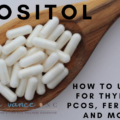One in three Americans has high blood sugar. Your doctor will tell you to be concerned if your fasting glucose levels are above 100-125 mg/dL. Although 100 mg/dL is often considered the cutoff for normal, studies have shown that fasting blood sugar levels in the mid-90s were predictive of future diabetes a decade later. Ideal fasting blood glucose is 85 mg/dL, so always request a copy of your lab work so you can spot potential problems before they become actual health issues. You can lower your blood sugar naturally, without drugs, by addressing diet and lifestyle!
If you have high blood sugar, between 100-125 mg/dL, you are considered prediabetic. You are diabetic if consistent fasting blood glucose readings are over 130mg/dL and your hemoglobin A1C is 6.5 or above (A1C is an average of your blood glucose levels over 3 months). You’ll likely be prescribed Metformin (and you likely won’t be asked about your diet or stress levels). Common Metformin side effects include nausea, diarrhea, vomiting, stomach pain, weakness, and hypoglycemia. But did you know there is a natural compound that has been tested and proven to lower blood glucose levels just as effectively as Metformin? And it has a list of benefits rather than side effects?
Enter berberine, a natural alkaloid found in several different herbs/plants such as barberry, goldenseal, Oregon grape root, phellodendron, and tree turmeric. It has long been used in Chinese medicine and has antibacterial, anti-inflammatory, and immune-enhancing properties. I often use berberine as part of my anti-candida and anti-parasite protocols.
Berberine has been pretty widely studied for its blood sugar lowering properties, unlike most herbs or natural compounds (the pharmaceutical industry cannot profit off plants, alas), and has been shown to reduce both fasting and postprandial blood glucose levels in type 2 diabetics. In fact, it’s been shown to work as well at Metformin for diabetes and pre-diabetes.
This is significant for 2 reasons:
- anti-diabetic drugs cannot be used in patients with hepatic dysfunction, renal disease, and heart disease, which makes pharmacological therapy of type 2 diabetes complicated
- berberine doesn’t have a mile-long list of potential side effects like most pharmaceutical drugs
- berberine actually has a list of positive effects on the body. That’s right: Rather than potentially causing harm, berberine can make you healthier.
So how does it work? Berberine has been shown to activate an enzyme inside the cell that regulates metabolism and boost fat burning, affecting body weight, triglyceride levels, blood cholesterol, insulin, and blood glucose.
Berberine’s benefits
- lowers blood glucose levels, both before and after meals
- improves cholesterol and insulin levels (making it useful also for PCOS)
- slows the breakdown of carbohydrates in the gut
- may promote weight loss: Boosts fat burning in the mitochondria
- may improve outcome for heart disease by lowering blood pressure and increasing blood flow
- may inhibit growth of cancer cells
- anti-microbial and anti-bacterial, making it great for SIBO, candida, parasites
High blood sugar and diabetes increase oxidative damage in the body, raising one’s risk for cancer and heart disease. Many people with diabetes also struggle with obesity, and berberine has been shown effective for fat burning and against cancer, heart disease, high blood sugar and insulin levels. This is a major win; a natural compound that works on a cellular level to improve metabolic syndrome and overall wellness. Does any prescribed drug do the same?
How to take Berberine
First off, quality matters. Herbs and plant compounds are not regulated as supplements, so it’s very important to buy them from a reputable and trusted source. The labels can be misleading, and contents can vary from batch to batch. For lowering blood sugar, I recommend Berberine Synergy (you can read more about its benefits by clicking the link), which is combined with alpha lipoic acid to help support optimal blood sugar and insulin levels, cardiovascular health, and liver health. It’s also effective for lowering insulin levels associated with PCOS. The dose is 1 per meal (3 daily). The company from which I source it has rigorous testing standards. For parasites and pathogens I use this product that combines berberine with other effective anti-microbial herbs.
This brand is also good for berberine-only (not combined with anything else).
Does Berberine have any potential risks?
Berberine has few if any significant side effects. It does have the potential to cause GI upset, and in my experience, this can be due to die-off of harmful bacteria in the gut (Herxheimer reaction). These symptoms typically pass after a week or two, but you can lower the dosage if this occurs. If you are taking any other pharmaceuticals, you’ll need to research or check with your doctor to see if there are interactions with berberine since it could lower blood sugar to harmful levels when combined with other drugs, like Metformin. It may also decrease effectiveness of certain drugs.
I recommend using herbs and plants instead of drugs in most cases because they work with your body chemistry on a molecular level rather than relieving symptoms and potentially creating further imbalance. Berberine is actually as effective, if not more, than blood sugar lowering drugs and has so many positive benefits. If you’ve been diagnosed with type 2 diabetes, you absolutely can control your hyperglycemia with diet and lifestyle changes, and berberine is an herb to add to your protocol. If you have pre-diabetes, start now by making the diet changes I outline here. Berberine can help lower blood sugar, control bad bacteria in the gut, and reverse chronic disease and oxidative damage (making it great for anti-aging)!

Mary Vance is a Certified Nutrition Consultant and author specializing in digestive health. She combines a science-based approach with natural therapies to rebalance the body. In addition to her 1:1 coaching, she offers courses to help you heal your gut and improve your health. Mary lives in San Francisco and Lake Tahoe in Northern California. Read more about her coaching practice here and her background here.







I I see you said berberine was good for sibo
What other anti microbials do you combine it with
Perhaps you don’t need any others
What about grapefruit seed extract ?
Patricia, check out my SIBO posts for more info on SIBO. How you treat it depends on if you are methane or hydrogen dominant. https://maryvancenc.com/got-bloat-sibo/
Thanks for this post. I’ve been searching for information on berberine die off symptoms, as I had digestive issues (loose stool) for the first two weeks of starting. Things went back to normal after I stopped taking the berberine — to see if that was the cause. I suspected die off issues, but couldn’t find much online until I saw your post. (I even wrote to the company that produced the supplement, Thorne, but they were very noncommittal in their response.
I started taking berberine because of chronic candida/Sibo symptoms, and have read many other positive articles about this supplement. I do think it stirred up some die off because of this, but I wasn’t sure if I should power through it and keep taking it.
Hi Cynthianne, berberine can certainly cause die-off, but it is usually not immediate and will typically subside. If you get immediate and continuous symptoms from an herb/supplement, it may mean you don’t tolerate it.
Hi Mary,
Similar to Cynthianne, I have had a really negative reaction to Berberine when used for Candida. Not so similarly though, for me it was nausea and vomiting. I stopped and switched gears when I figured out the cause, as it was brutal.
However in hindsight I thought I might have mistaken a Herxheimer reaction for bad side effects. I have retried, and found that I seem to be able to tolerate a pretty low dose, about 33 mg, but not more. Do you think this is just die-ff reactions?
Hi Angelina, immediate and severe reactions like you describe are typically allergies or intolerance to the herb. Die-off doesn’t usually produce vomiting and is more subtle. If you feel ok on a lower dose you can try that.
How long are you able to take berberine? Does it lose its effectiveness after a time period?
Steven, it’s a good question. It seems to be safe long term and doesn’t seem to lose effectiveness for blood sugar balance (it may for killing bad gut bacteria which may become resistant). I have researched pretty extensively how long one can safely take berberine and haven’t found anything alarming.
Hi – I started taking berberine a couple of days ago to assist with bacteria (not diagnosed with SIBO yet) because I have rosacea. I don’t have any gut or other issues but finding my rosacea is flaring up. I’m only on 100mg a day (building up) and this is the second time I’m trying – I’m getting skin flushes only. do you think this is die off or too early?
Hi Jade, likely not die-off. Some people just react poorly to berberine. you can stop it for a few days then add it back in and work up slowly to see if that helps.